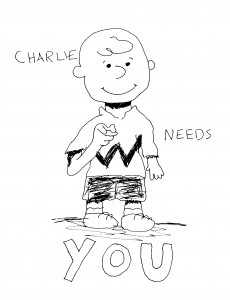Charlie Brown on feeling down
Anonymous blogger Charlie Brown calls for the destigmatisation of depression and mental illness at the University of Warwick
One in four of us will suffer with some form of mental illness in our lives, of those one in four, nearly 80 percent won’t seek any medical treatment because of the stigma associated with mental illness. There are a whole bunch of perceptions associated with mental illness: that it’s a sign of weakness, that it is a “Western problem”, that it isn’t a “real illness”. We need to dispel these myths, and fast.
Robert Sapolsky, Professor of Biological Sciences, Neurology, Neurological Sciences and Neurosurgery at Stanford University is one of the world’s foremost authorities on the subject of depression. According to Sapolsky, depression is on track to becoming such a common illness that it will be second only to obesity-related disorders by 2025. The World Health Organization estimates that it is already the world’s fourth leading cause of disability today. In a lecture delivered at Stanford, Sapolsky even went as far as to say that “depression is like the worst disease you can get. It’s devastating.”
One of the problems we have in our society today is that “depression” is a word which gets thrown around a lot. You might use the same word to describe feeling blue about the fact that it’s raining as I would to explain the reason I tried to commit suicide on more than one occasion.
Stanford’s Sapolsky On Depression in U.S. (Youtube Full Lecture)
“Depression” as we understand it has three essential levels: the first involves you having some bad news, or something upsetting you – you might be down for a few days, but you’re back on your feet before you know it. This is called ‘everyday depression’. The second involves more serious traumas or events affecting you – you could be depressed for weeks or even a few months before you feel better and you may need some help to get there, this is called ‘reactive depression’. The third (which I supposedly have) involves you dipping in to depressions from which, after a very prolonged period of time, you do not bounce back. This is called ‘major depression’. Sapolsky humorously defines major depression as “a biochemical disorder with a genetic component and early experience influences where somebody can’t appreciate sunsets.”
When I came to university I had a lot of hopes and dreams about what I would do and who I would become, but those fell apart pretty quickly because of depression. As far back as I can remember, I’ve been anxious and of a depressive disposition. However, it wasn’t until November last year that I was formally diagnosed as having severe clinical anxiety and depression. I was in denial for years about my mental health, and for the most part my life functioned pretty normally. Over time, what started off as something I fought and kept locked in a corner of my mind grew and grew until I was a danger to myself. Last year I ran a bath, put on presentable clothes and sat contemplating whether I would drop the nearby toaster into it and end my life. This came after a few weeks of experimenting with self-harming.
If reading that last paragraph shocks you, bear in mind that, statistically, someone you know or even you yourself could succumb to the thoughts and feelings that cause such behaviour. Despite its commonality there’s a huge social stigma and taboo surrounding mental illness. Regardless of whether one suffers with mild depression or body dysmorphia or even agoraphobia, they are tarred with the same brush. Mental illness has connotations with weakness, being “unable to deal with life”, being weird. We think of people who are on a path to wearing a straight-jacket as opposed to someone who needs help and care. We treat mental illness completely differently to how we treat colds, viruses and broken bones. We shouldn’t.
Despite the University knowing about my condition, I’ve been threatened with deregistration twice. The first time, I went to the Boar in outrage; the second I just tried my best to stay calm. On both occasions the University has apologised to me; I wish I could tell you that I’d had a good experience with the University – that they had made reasonable adjustments, looked after me and offered me help. Sadly, I feel that they’ve failed me, and judging by the messages I receive through my blog they have failed many others too. One of the worst incidents I have endured involved a lecturer of mine, who I had been informed was aware of my situation, stopping a lecture and drawing attention to the fact that I turned up so irregularly. When you are trying to maintain an image of normality, things like that don’t help.
Did you know, for example, that the University does not make mental health training mandatory for personal tutors and that a frightening proportion of them simply consult an online handbook if one of their students comes to them with a mental health issue? Personally, I think it’s reasonable to expect a portion of the £9,000 fee we each pay to cover essential training. Each student faces the possibility that they could find themselves needing competent help, not advice recited from a PDF.
The University of Warwick is supposed to be a place of education, innovation and progressive thinking, yet I find myself a member of a student body in which I feel I have to hide my condition. One of my closest friends, on the night I had told myself I would admit my condition to her, casually said to me “you can never look at someone the same way if they’ve told you they have depression, don’t you think?” I silently nodded, and decided to continue to hide my condition. The overwhelming majority of messages I have been sent from Warwick students describe exactly the same feelings about secrecy that I have. This can’t go unchallenged. With every passing day that we as a student body allow mentally ill people to live with this stigmatised feeling, with every day that we do not talk about mental health issues, with every day that we allow the staff to fail our students, we are behaving unacceptably.
We celebrate and discuss so many movements towards equality at Warwick – marginalisation of race, gender and sexuality is healthily and successfully discussed and challenged. Adding mental health to that list is long, long overdue.
Charlie Brown blogs about his life as a university student with depression at: adiaryofadepressedstudent.blogspot.com


Comments (2)
Very brave and honest article. Well done.